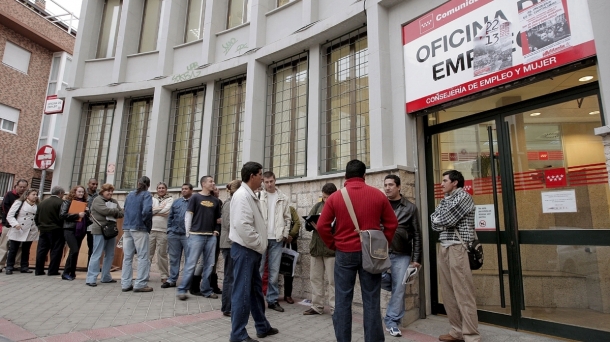news
Economic crisis
Unemployment in the euro-zone hits its highest level
AP
London
Eurostat, the EU's statistics office, said unemployment in the eurozone rose to 10.8 percent in February from 10.7 percent the previous month.
-

Spain's unmeployment office. Photo: EFE
Unemployment in the 17 countries that use the euro hit its highest level since the currency was introduced back in 1999, official figures showed Monday, in a further sign that the region is back in recession as governments cut spending to deal with their debts.
Eurostat, the EU's statistics office, said unemployment in the eurozone rose to 10.8 percent in February from 10.7 percent the previous month. The number of unemployed totaled 17.1 million, nearly 1.5 million higher than the same month a year ago. The figures stand in marked contrast to the U.S., which has delivered solid increases in employment over the past few months.
The eighth straight monthly increase will likely reinforce expectations that the eurozone is in recession just as many countries pursue austerity measures to get a handle on their debts. Spain, whose government announced another raft of austerity measures last Friday, had the highest unemployment rate in the eurozone of 23.6 percent, with youth unemployment, those under 25 years of age, standing at 50.5 percent.
Figures earlier indicating a bigger-than-anticipated downturn in manufacturing only added to the gloom surrounding the eurozone economy. Financial information company Markit said its purchasing managers index, a gauge of business activity, fell to a three-month low of 47.7 in March from the previous month's 49, anything below 50 indicates a contraction.
Markit said Germany and France, the eurozone's two powerhouse economies, saw activity levels deteriorate. France, in particular, fared worse with activity at a 33-month low of 46.7. Only Austria and Ireland saw output increase during the month.
Across the eurozone, Markit said, new orders contracted at a faster rate than in February and that led to further job losses.
The manufacturing sector is vital for Europe's economic growth at a time when many countries are implementing austerity measures to get a handle on their debts.
Following a 0.3 percent quarterly economic contraction across the eurozone in the fourth quarter of 2011, analysts said the manufacturing data show that the region is more likely to fall back into recession, technically defined as two quarters of negative growth.
"It looks odds-on that eurozone GDP contracted again in the first quarter of 2012 .... thereby moving into recession," said Howard Archer, chief European economist at IHS Global Insight. "And the prospects for the second quarter of 2012 currently hardly look rosy."
Markets across Europe Monday gave up their early gains on the news of the two reports with the Stoxx 50 of leading European shares down 0.2 percent, having opened earlier moderately higher on upbeat data from China.
top stories



-
news
New anti-eviction law
Andalucia begins proceedings to seize confiscated houses from banks
-
news
London attack
British police ponder conspiracy after soldier murder
-
Sport
Giro d'Italia
Nibali tightens grip on overall lead after stage victory
© EITB - 2024 - Privacy Policy - Legal disclaimer - Cookie Policy - Cookie settings


